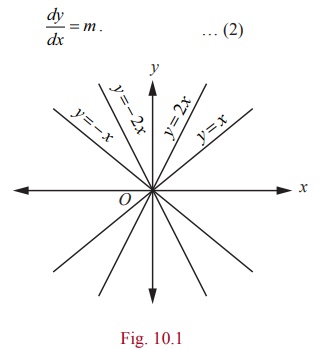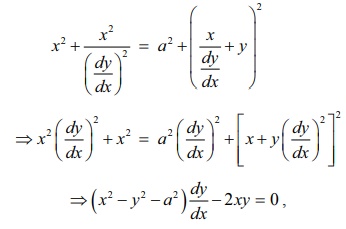Mathematics - Formation of Differential Equations from Geometrical Problems | 12th Maths : UNIT 10 : Ordinary Differential Equations
Chapter: 12th Maths : UNIT 10 : Ordinary Differential Equations
Formation of Differential Equations from Geometrical Problems
Formation of
Differential Equations from Geometrical Problems
Given a
family of functions parameterized by some constants, a differential equation
can be formed by eliminating those constants of this family. For instance, the
elimination of constants A and B from y
=
Aex +
B e−
x , yields a differential
equation d2y/dx2
−
y = 0.
Consider
an equation of a family of curves, which contains n arbitrary constants. To form a differential equation not
containing any of these constants, let us proceed as follows:
Differentiate
the given equation successively n
times, getting n differential
equations. Then eliminate n arbitrary
constants from (n +1)
equations made up of the given equation and n
newly obtained equations arising from n
successive differentiations. The result of elimination gives the required
differential equation which must contain a derivative of the nth order.
Example 10.2
Find the
differential equation for the family of all straight lines passing through the
origin.
Solution
The
family of straight lines passing through the origin is y = mx , where m is an arbitrary constant. … (1)
Differentiating
both sides with respect to x, we get

From (1)
and (2), we get y = x dy/dx. This is the required differential
equation.
Observe
that the given equation y =
mx contains only one arbitrary constant
and thus we get the differential equation of order one.
Example 10.3
Form the
differential equation by eliminating the arbitrary constants A and B from y = A cos x + Bsin x .
Solution
Given
that
y = A cos x + Bsin x ... (1)
Differentiating
(1) twice successively, we get

Substituting
(1) in (3), we get d2y/dx2 +
y = 0 as the required differential
equation.
Example 10.4
Find the
differential equation of the family of circles passing through the points ( a, 0) and ( −a, 0) .
Solution
A circle
passing through the points ( a,
0)
and (
−a, 0) has its centre on y - axis.
Let (
0, b) be the centre of the circle. So,
the radius of the circle is √[a2 + b2].
Therefore
the equation of the family of circles passing through the points (
a, 0) and ( −a, 0) is x2 + ( y − b)2 = a2 + b2 , b is an arbitrary constant.
Differentiating
both sides of (1) with respect to x,
we get

Substituting
the value of b in equation (1), we
get

⇒ ( x2 − y2 − a2 ) dy/dx − 2xy = 0 , which is the required differential
equation.
Example 10.5
Find the
differential equation of the family of parabolas y2 = 4ax , where a is an
arbitrary constant.
Solution
The
equation of the family of parabolas is given by y2 = 4ax , a is an arbitrary
constant. ... (1)
Differentiating
both sides of (1) with respect to x ,
we get 2y dy/dx = 4 a ⇒ a = y/2 dy/dx

Substituting
the value of a in (1) and
simplifying, we get dy/dx = y/2x
as the required differential equation.
Example 10.6
Find the
differential equation of the family of all ellipses having foci on the x -axis and centre at the origin.
Solution
The
equation of the family of all ellipses having foci on the x -axis and centre at the origin is given by

where a and b are arbitrary constants.
Differentiating
equation (1) with respect to x, we
get

Substituting
the value of 1/a2 in equation (2) and simplifying, we get

which is
the required differential equation.
Remark
The
result of eliminating one arbitrary constant yields a first order differential
equation and that of eliminating two arbitrary constants leads to a second
order differential equation and so on.
Related Topics